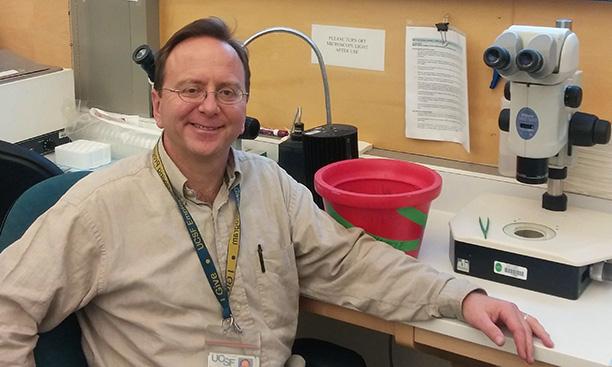
Ben Cheyette ’88 has been interested in the brain and behavior ever since his high school days, even going so far as to explore these interests while working as an usher at his local movie theater.
“I was the only usher working there who, in the ticket booth during the off hour, was reading Scientific American about some of the latest neuroscience at that time,” Cheyette said. “I was a little bit of a nerd.”
Fast-forward to today, where Cheyette is an associate professor of psychiatry at the University of California, San Francisco. His research involves looking at how lithium, which has been used to treat people with bipolar disorder, affects the brain and impacts behavior.
In the October edition of Molecular Psychiatry, Cheyette and his coauthors published the results of a study showing that people with psychiatric disorders, such as autism, schizophrenia, and bipolar disorder, were more likely to have rare single point mutations in a gene called DIXDC1. When he eliminated or reduced the DIXDC1 gene, he found that mice developed behavioral abnormalities, and he was able to reverse these effects by treating the animals with lithium.
One of Cheyette’s most important findings was that he was able to show what was happening in the brain of the mice. When the gene was eliminated or mutated, this led to changes in the dendritic spines of the mice’s neurons, which are thought to be one of the major substrates for behavioral adaptability, such as learning and memory. These changes were mediated by the Wnt signaling pathway, which had previously been shown to impact behavior in mice. Finally, Cheyette was able to reverse the behavioral changes in the mice without the gene by treating them with lithium, which boosts Wnt signaling.
For years, many psychiatrists thought that behavioral disorders like bipolar disorder and schizophrenia were controlled by different mechanisms. However, Cheyette noted that this view is starting to become less popular due to advances in gene sequencing.
“There is a lot of overlap at the genetic level between some psychiatric disorders that seem very distinct in terms of the behavioral syndrome we see in the clinic,” Cheyette said.
He noted that this research opens to door to advances in precision medicine, where a patient’s gene can be sequenced to find mutations that give rise to a psychiatric disorder. The treatment could then be tailored to those specific biological and non-biological causes.
“The approach of identifying specific genes involved in each patient, referred to as precision medicine, is what is now being done with cancer, and the future of psychiatry is going to be similar since fundamentally the problem is similar,” Cheyette said.
At Princeton, Cheyette majored in biology and worked in a psychology lab, where he studied the effect of neuronal activity on the behavior of sea slugs with Professor Joseph Farley. During his senior year, he met his future wife, Sarah Resnik ’88.
Upon graduating, Cheyette entered an MD/Ph.D. program at UCLA, where he worked with UCLA Professor Larry Zipursky, who was researching neural development in Drosophila melanogaster, more commonly known as fruit flies. In 1996, a paper by Peter Klein and Doug Melton caught Cheyette’s attention: The researchers showed that lithium, which had been widely used in psychiatry since the 1940s, had the ability to inhibit an enzyme in the Wnt signaling pathway in fruit flies. A few months later, another paper showed that knocking out a gene involved in the Wnt signaling pathway in mice led to behavioral abnormalities, such as in maternal and subconscious social behavior.
“At that time, the Wnt signaling pathway was already well established to be important in basic embryology, and when abnormally activated, in cancer,” Cheyette said. “But it hadn’t been implicated in behavior and psychiatry.”
Cheyette’s interests in psychiatry and molecular biology led him to pursue a career researching the Wnt signaling pathway, which is the basis for his current work.
In addition to his research, Cheyette spends one day a week seeing patients at the UCSF Hospital, and he recently published a book with his wife, a pediatric neurologist, and another co-author about treating ADHD using athletic coaching techniques. He likes to spend time with his wife and four children, and still remains connected to Princeton, as his oldest daughter Madeleine is a member of the Class of 2019. His oldest son, Jonah, has the middle name “Tiger.”
